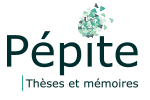La traduction chez David Mitchell (1999-2017) : pratiques et représentations
David Mitchell in and on translation (1999-2017)
- Traduction
- Littérature
- Tournant fictif
- Anglais
- Mitchell, David (1969-....)
- Traductions
- Littérature -- Traduction
- Traduction
- Translation
- Literature
- Fictional turn
- English
- Langue : Français
- Discipline : Langues et littératures anglaises et anglo-saxonnes
- Identifiant : 2024ULILH055
- Type de thèse : Doctorat
- Date de soutenance : 06/12/2024
Résumé en langue originale
Depuis son premier roman Ghostwritten en 1999, jusqu'à sa plus récente parution (Utopia Avenue en 2020), l'auteur britannique contemporain David Mitchell tente de bâtir un univers de fiction unique et interconnecté qui ne cesse de s'accroitre à chaque publication. Cette volonté de continuité s'observe également dans la cohérence de ses thématiques, parmi lesquelles figure en bonne place la question de la communication et des langues. Ce leitmotiv récurrent nous a poussé à nous interroger sur la place qu'occupe la notion de traduction dans son œuvre globale. Cette thèse se propose d'étudier trois facettes de l'écrivain en rapport avec la traduction : l'auteur mettant en scène la traduction dans sa fiction, l'auteur traduisant, et l'auteur traduit. Chacun de ces trois grands axes met en lumière le caractère unique de l'artiste quant à l'acte de traduire. Ses romans ressuscitent ainsi les interprètes historiques de la tradition japonaise qu'étaient les Oranda ts?ji au XVIIème siècle, présentent des immortels polyglottes ou des traducteurs amateurs, autant de figures rarement explorées dans le domaine du fictional turn of the translator. La propre expérience de traducteur professionnel de David Mitchell (aidé par son épouse Keiko Yoshida) est tout aussi particulière, par son choix de faire partager au monde sa version anglaise de The Reason I Jump, témoignage sous forme livresque d'un jeune adolescent autiste non-verbal nommé Naoki Higashida. La genèse complexe de l'œuvre originale ainsi que la motivation expliquée par un amour filial en font un objet d'étude fascinant, autant dans le domaine de l'éthique que de la neurologie. Sera également explorée dans cette partie une autre traduction moins connue de David Mitchell mais néanmoins originale : sa participation au projet collaboratif international Multiples, un jeu grandeur nature de traduction-relais. La dernière partie de cette thèse se penchera sur la manière dont Manuel Berri, traducteur quasi-attitré de David Mitchell depuis le début de sa carrière, a su relever les défis de sa prose qui s'avère retorse. Nous analyserons comment le traducteur a réussi à surmonter ces obstacles que sont les références culturelles implicites, les néologismes ou l'oralité de l'anglais non-standard, qu'il ait recours à la note de traducteur (dont nous essayons de prouver la légitimité), ou bien plus souvent grâce à sa créativité pour transmettre en langue française toute la versatilité de notre auteur. Cette thèse se termine par un entretien exclusif avec David Mitchell en personne, où ce dernier se livre sur sa vision de la traduction et nous confie ses futurs projets en relation avec cette dernière, preuve d'une obsession qui n'a pas fini de hanter sa production littéraire.
Résumé traduit
From his first novel Ghostwritten in 1999 to his most recent (Utopia Avenue in 2020), contemporary British author David Mitchell has tried to build a unique and interconnected world of fiction which keeps growing with each new publication. This desire for continuity can also be seen in the coherence of his themes, among which the question of communication and languages stands prominently. This recurring leitmotif prompted us to examine the notion of translation throughout his work. This thesis will examine three aspects of the writer in relation to translation: the translator characters in his fiction, his experience as a translator, and the translation of his works. Each of these parts highlights the uniqueness of this artist in regards to translation. His novels resurrect the historical interpreters of the Japanese tradition, the Oranda tsujis of the 17th century, and showcase such figures as polyglot immortals and amateur translators, new archetypes which have not or rarely been explored in the field of the fictional turn of the translator. David Mitchell's own experience as a professional translator is just as special, in his choice to share with the world (and with the help of his wife Keiko Yoshida) an English version of The Reason I Jump, the memoir of a young non-verbal autistic teenager called Naoki Higashida. The complex genesis of the original work, as well as the motivations - namely filial love - behind his translation, make it a fascinating object of study, as much in the field of ethics as neurology. This section will also explore another of David Mitchell's lesser-known but nonetheless original translations: his participation in the collaborative project Multiples, an international exercise in relay translation. The final part of this PhD thesis will explore the ways in which Manuel Berri — David Mitchell's unofficial assigned translator since the start of his career — has risen to the challenge of his surprisingly tricky prose. We will analyse how he managed to overcome such obstacles as implicit cultural references, neologisms and the orality of non-standard English, whether by using translator's notes (which we are trying to legitimise) or, more often, by using his creativity to convey all the versatility of our author in the French language. This thesis will conclude with an exclusive interview of David Mitchell himself, in which he offers us his views on translation and reveal some of his future translation-related projects, proving once again how much this obsession keeps haunting his literary output.
- Directeur(s) de thèse : Jenn, Ronald
- Président de jury : Karsky, Marie-Nadia
- Membre(s) de jury : Larsonneur, Claire - Antoine, Fabrice - Takeuchi, Rie
- Rapporteur(s) : Karsky, Marie-Nadia - Sardin, Pascale
- Laboratoire : Centre d'études en civilisations, langues et littératures étrangères (Villeneuve-d'Ascq, Nord)
- École doctorale : École doctorale Sciences de l'homme et de la société (Lille ; 2006-....)
AUTEUR
- Loiez, Thibaut



